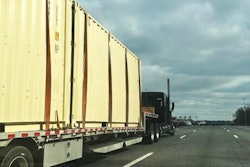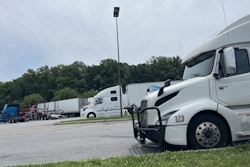A new report from the American Transportation Research Institute reveals the true costs and impacts of cargo theft. Annualized cost to trucking ATRI pegged at a whopping $6.6 billion -- more than $18 million per day.
- The new “Fight Against Cargo Theft” report gathered feedback and data from motor carriers and logistics service providers (LSPs) -- brokers, 3PLs and others.
- The aim of ATRI's new report was to uncover theft trends, examine the costs and identify countermeasures.
- Motor carrier respondents to an ATRI survey that underlies data in the report showed more than $16M of cargo losses in 555 separate incidents during 2023, with an average loss per incident of around $29,000.
- For brokers and other LSPs the issue is even more stark: $33 million reported lost by survey respondents in 2023, with an average loss of nearly $100K per theft.
“Unfortunately, we’ve reached a point where cargo theft has become a standard cost of doing business for trucking companies, with consumers ultimately footing the bill for many billions of dollars in losses,” said Ben Banks, president of Nashville, Tennessee-based intermodal carrier TCW.
 Readers can download ATRI's full report via this link.
Readers can download ATRI's full report via this link.
In the case of the heist of Fieri and Hagar's Santo tequila, two full truckloads of tequila worth more than $1 million were stolen in November 2024 in what turned out to be a sophisticated double brokering scheme. Fieri recently told CBS' 60 Minutes his company has "strong measures" in place with "security, awareness, and communication -- the way we do business." Yet it wasn't enough. "Everybody's vulnerable," he added.

“Something must be done to stop these costly crimes," TCW's Banks added. He felt ATRI's new research put "real-world numbers to the issue and will hopefully motivate stakeholders to act quickly on solutions.”
[Related: Cargo theft explosion: What is to be done? DOT wants to know]
A multi-billion-dollar problem
ATRI’s survey data featured cargo losses that occurred in 2023, mostly. That same year, cargo theft recording firm CargoNet received reports of 2,852 incidents from carriers, which amounted to $332 million worth of stolen cargo for an average loss of $116,397 per incident.
Motor carrier respondents to ATRI’s survey reported a total of $16,155,207 worth of cargo stolen in 555 separate incidents during 2023. The average annual loss per participating motor carrier: $521,000, with an average loss-per-incident of $29,108 and an average loss-per-registered-truck of $383.60.
 ATRI survey respondents were fairly evenly distributed across fleet sizes larger than 25 trucks, with smaller fleets with fewer than 25 trucks representing fewer than 20% of respondents.ATRI
ATRI survey respondents were fairly evenly distributed across fleet sizes larger than 25 trucks, with smaller fleets with fewer than 25 trucks representing fewer than 20% of respondents.ATRI
ATRI Vice President Jeffrey Short described researchers' process in simplified terms, noting the survey asked respondents for the value of cargo stolen. Then, researchers "calculated that up," he said. "We looked at how many trucks they had, what percentage of the industry, and then we expanded that outward to cover the entire industry, making assumptions based on our response rate.”
Brokers and other LSPs' losses reported via the survey effectively doubled the motor carriers' at $33 million in cargo value, with an average annual loss per LSP of $1.8 million, and a loss of $95,351 per theft.
The majority of motor carrier cargo thefts (69.9%) fall below $50,000, ATRI found, while the majority of LSP cargo thefts (59.7%) are above $100,000, with full truckloads stolen by so-called strategic means (carrier identity theft, impersonation and the like) much more common for desk-bound brokers.
Cargo value isn't the only or even the most direct of losses for motor carrier victims. As noted, often enough truck and trailer combos or full trailers are lost, and there's consideration for downtime and lost revenue when that equipment needs found or replaced. “This could be anything from lost sales, opportunity cost, downtime when a truck isn’t moving -- let’s say it’s been stolen," Short said. "You’re not making any money on it. You may be paying a lease on that truck, for instance, and you may be paying your driver, but if no freight is moving, there’s a loss there.”
A big one. One motor carrier estimated truckload revenue at $3,971 per truck per week. ATRI estimated downtime costs are three to six times the value of the stolen cargo. That's to say nothing of the customer relationships damaged as a result.
Based on ATRI’s estimates, the total direct and indirect costs of cargo theft to the trucking industry was between $1.8 billion and $6.6 billion.
[Related: Owner-op jailed after unwitting participation in cargo theft: Cautionary tale, mitigating risk]
The freight being stolen: What, how, and where
A carrier’s likelihood to be hit by thieves varies by size of the operation, operation type, the type of goods hauled and basic geography. Pilferage (where some freight is physically removed and thieved from a shipment) is the most common theft type experienced by motor carriers (39.9%), followed by straight theft, when an entire truck/trailer is stolen (31.5%). The by-all-accounts growing category of strategic theft, using fraudulent impersonation and identity theft tactics, accounted for 20.3% of thefts experienced by motor carriers.
For brokers and other LSPs, strategic theft accounted for the outright majority (62.5%) of incidents. Straight thefts made up 25.7% of thefts for LSPs, pilferage just 11.8%.
 Because strategic theft made up the majority of thefts from logistics service providers, and carriers experienced more direct thefts like pilferage and straight theft, the locations where thefts occurred varied greatly.ATRI
Because strategic theft made up the majority of thefts from logistics service providers, and carriers experienced more direct thefts like pilferage and straight theft, the locations where thefts occurred varied greatly.ATRI
Based on carriers’ responses, pilferage often occurs at their own terminals. “This speaks to the need for secure facilities and access to facilities by trusted/vetted people only,” ATRI’s report said.
[Related: Outpost hopes to boost parkng security, management features with new tech]
Short noted researchers spoke one-on-one with a number of carrier representatives and were told that, even if the trucking company has fences, security cameras or even guards on-site, “there are still instances where people will somehow get in the fence, open up trailers” and look for goods.
“They don’t always find something” they want, he added, but “they will go through and look for stuff that they might be able to sell. They may break into a trailer and just leave everything because it’s not something they’re interested in; it’s not something they can carry off.”
 Food was reported as the most-stolen product type, followed by electronics, automotive parts and beverages.ATRI
Food was reported as the most-stolen product type, followed by electronics, automotive parts and beverages.ATRI
A lot of freight moves to and out of California, obviously. “It’s also got a very large maritime port," Short said, "an international border crossing. There are lots of different ways to move stolen goods, and of course, move them even out of the country to sell.”
Read next: Cargo theft proliferation ups the ante on truckers' prevention
[Related: California cargo theft horror stories]











